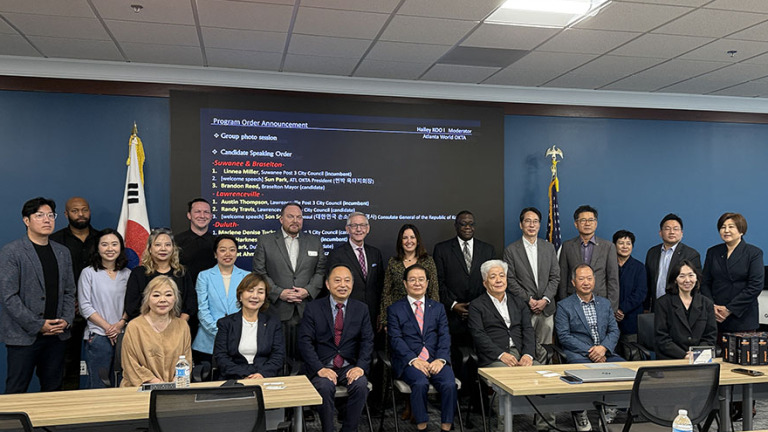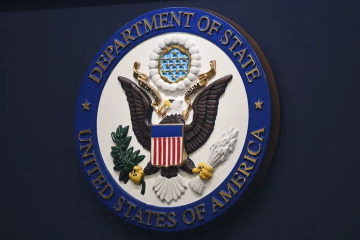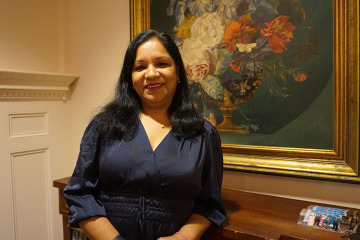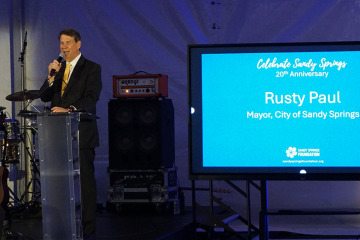Duluth, October 15, 2025 — For 24 years, Sun Park ran his business in Gwinnett County without knowing who sat on his city council or served as mayor. On Tuesday, that changed.
Park, president of the Atlanta chapter of World OKTA (World Federation of Overseas Korean Economic and Trade Associations), stood before a room of fellow Korean American entrepreneurs and local political candidates at the Gwinnett Chamber of Commerce, articulating what many immigrant business owners have long felt but rarely voiced in public forums.
“We need to break the barrier and we need to communicate with each other,” Park told the audience. “As a minority person, I want to listen to your voice.”
The forum, organized by Atlanta World OKTA and the Korean American Chamber of Commerce, marked a watershed moment in the political maturation of one of Georgia's fastest-growing immigrant communities. Mayoral and city council candidates from four cities — Suwanee, Braselton, Lawrenceville, and Duluth — came seeking support from Korean American voters and business owners whose economic clout is increasingly shaping the region's politics.
The event reflected broader demographic shifts transforming the suburban Atlanta area. In Suwanee alone, Asian Americans now comprise nearly a quarter of the population, with Korean Americans representing the largest segment. Similar patterns have emerged across Gwinnett County, where strip malls feature Korean signage and churches hold services in multiple Asian languages.
“We wouldn't be the community that we are with the reputation that we have for being inclusive, for being innovative, for being connected, for having excellence, if it wasn't for you,” Linnea Miller, a Suwanee city councilwoman seeking reelection, told the crowd.
The candidates' pitches revealed how immigrant business owners have moved from the periphery to the center of local political calculations. Several officials detailed granular knowledge of Korean community institutions and touted relationships with Asian American nonprofit organizations.
But the forum also exposed persistent frustrations among immigrant entrepreneurs navigating local government bureaucracies designed without multilingual communities in mind.
Brandon Reed, a small business owner running for mayor of Braselton, criticized his city for quintupling late renewal fees for business licenses — from $50 to $500 — calling it an unwelcoming message to entrepreneurs juggling long hours and complex regulations.
“When you say, if you want to renew your license after December 31st, we're going to punish you, that doesn't make sense to me,” Reed said. “That's not very warm and welcoming.”
The policy criticism resonated with business owners in the audience, many of whom described struggling with permits, zoning applications and regulatory documents written in impenetrable legal language.
Austin Thompson, a Lawrenceville councilman and Guyanese immigrant, said he regularly walks business owners through paperwork in person. “Sometimes when you're reading a 12, 13, 15-page document that's written in legal ways, sometimes it's really hard to understand,” he acknowledged.
Several candidates pledged concrete changes: translation services for city documents, regular roundtables with immigrant business leaders, and personal accessibility through published cell phone numbers and scheduled coffee meetings.
The forum's convening itself signaled shifting political winds. A representative from the Consulate General of the Republic of Korea in Atlanta attended, underscoring the diplomatic weight Korean officials now place on their diaspora's political engagement in the American South.
Randy Travis, another Lawrenceville council candidate, framed immigration as central to American success, noting his Ukrainian grandfather fled to the United States as a refugee. “If it wasn't for immigration, I don't know what our country would look like,” Travis said. “It certainly wouldn't be as successful as it is today.”
He described creating campaign videos in multiple languages — including Korean, Spanish and Croatian — using artificial intelligence to reach non-English speaking voters.
Such outreach would have been unthinkable a generation ago in Gwinnett County, historically a conservative white suburb. Now candidates compete to demonstrate cultural fluency and relationships with immigrant communities that vote, own property and drive economic development.
Sarah Park, a Korean immigrant and coffee shopowner running for Duluth City Council, embodied the community's political evolution. Having worked in county government for over a decade, Park told the audience she understands both sides of the counter.
“Behind every small business, I see a family, I see a dream, and a community that depends on it,” Park said, pledging to establish regular forums for small business owners if elected.
The forum's most revealing moments came when candidates spoke in the language of data and results tailored to business-minded voters. Jamin Harkness, the Duluth councilman seeking re-election, cited crime statistics, employment rates, and tax stability to demonstrate his city's effective governance.
“Our crime is down 36% in the last four years, our taxes have stayed the same for nine years while we have growth,” Harkness said, noting Duluth's 2.6% unemployment rate compared to Georgia's 3.9%.
Yet beneath the optimistic rhetoric about diversity and inclusion, the forum exposed how immigrant communities must still explicitly request basic accessibility from local government — translation services, comprehensible documents, and officials willing to answer their phones.
Marlene Taylor-Crawford, a Lawrenceville councilwoman who has worked with Korean youth programs and Pan Asian service organizations for decades, urged fellow officials to approach immigrant communities with humility.
“Listen not to respond, but listen to understand,” Taylor-Crawford said. “I can't come into any community and tell you what to do because I don't live the day-to-day experience.”
As the forum concluded, attendees were encouraged to support a local school infrastructure tax that funds construction without raising property taxes — a pitch that assumed immigrant business owners see themselves as permanent stakeholders in these communities' futures.
For Sun Park, President of Atlanta World OKTA, that assumption reflects hard-won progress. After a quarter-century running a business in anonymity from local government, he now sees Korean American entrepreneurs demanding — and receiving — a seat at the table.
“It's time we need to communicate with the candidate,” Park said. The roomful of candidates nodding in agreement suggested they've gotten the message.









